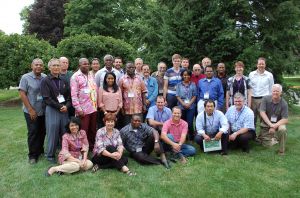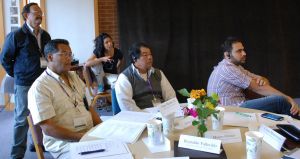Mennonite World Conference launches new study of its global members

Nearly 30 people from 18 countries gathered at Goshen College on July 29-Aug. 2 to launch the Mennonite World Conference (MWC) “Global Anabaptist Profile.”
The MWC project, which is organized and funded by the Institute for the Study of Global Anabaptism at Goshen College, will be the first systematic study of how the MWC “shared convictions” are finding expression among the 25 groups participating in the study. It will also shed new light on the demographics of the rapidly-growing global Anabaptist family and create a digital library of testimonies from pastors and lay members of Mennonite and Brethren in Christ congregations around the world.
“The size of the Anabaptist-Mennonite global fellowship has nearly tripled in the past three decades, with most of the growth coming outside of Europe and North America.” said John D. Roth, director of the institute and secretary of the MWC Faith and Life Commission. “Yet we really don’t know very much about the lived experiences – the beliefs, practices and challenges – of our global body. We hope this project will provide a clearer understanding of who we are as a global family and deepen our sense of a shared identity.”
According to Roth, the project has been in development for nearly three years. In 2010 he participated in a gathering of international church leaders from 12 conferences to interpret the results of the Multi-Nation Anabaptist Profile, a study undertaken by Eastern Mennonite Missions.
“When I saw the energy generated in those conversations, I was convinced that MWC could benefit by a similar project that was more representative of its member groups and focused on its shared convictions,” Roth said. He soon found ready allies in Conrad Kanagy, professor of sociology at Elizabethtown College, who had directed the Multi-National Anabaptist survey, and César García, newly-appointed general secretary of MWC.
In 2011, Roth helped to establish the Institute for the Study of Global Anabaptism at Goshen College and initiated a series of conversations with MWC, Mennonite Central Committee (MCC) and the mission agencies of various Mennonite conferences regarding the global survey. Following the approval of the project by MWC’s Executive Committee and General Council, Roth forged a partnership with Kanagy, who has extensive experience with similar church member profiles. Kanagy will serve as a co-director of the project.
The 25 MWC member conferences who are participating in the Global Anabaptist Profile were selected randomly, with proportional representation within each of MWC’s five regions. In the spring of 2013, church leaders from each group identified a research associate to carry out the project within their country. At the recent consultation in Goshen, the research associates met for four days to revise the survey, refine additional questions specific to their conference and receive basic training in social research methods. They also spent time in daily worship, sharing, singing and prayer.
Participants in the consultation expressed resounding enthusiasm for the project. “The task ahead is enormous, but I’m very hopeful that the project will help my church better understand where we are, where we are heading and how we fit into the global church—the bigger Body of Christ,” said Tigist Tesfaye Gelagle, who represented the Mesete Kristos Church in Ethiopia.
Francis Kamoto, of the Brethren in Christ church in Malawi, echoed those sentiments, adding that the project “will help us be known to other conferences who are also participating.”

“The research will be owned by our church,” said M.Z. Ichsanudin of the GITJ church in Indonesia, “so that our conference will have data that can help our decisions. This is a bridge for building brotherhood among the Mennonite churches all around the world.”
Roth acknowledged the complexities of the project, noting especially the cross-cultural differences in understanding theological terms, the logistical challenges some Research Associates will face in reaching remote congregations, the challenge of illiteracy in some contexts, and the fact that survey results can never fully capture the full reality of our beliefs and practices. “Ultimately, the survey is more like an X-ray than a photograph. But we hope that it will give a better understanding of some basic trends and directions in our global family, and that the interviews can supplement the quantitative data with individual stories that provide greater texture and nuance.”
The project has received grants from MCC and the Schowalter Foundation, with most of the financial support coming from individual contributions. Organizers hope that the Global Anabaptist Profile will be completed in time for “Pennsylvania 2015,” the MWC Assembly to be held in Harrisburg, Pa., in July 2015.
As he departed the consultation, Jethro Dube, research associate for the Brethren in Christ church of Zimbabwe, summarized his hopes for the MWC Global Anabaptist Profile. “It’s been wonderful to be reminded that we are no longer strangers, that we are part of the family of God, citizens with God’s people wherever we are in our little corners of the world. And that we have the responsibility of upholding each up and maintaining our unity as a family. The project emphasizes our connectedness as members of the faith and as God’s children. It will reveal to the members of the body in the remotest corners of my country that they are also part of the larger family, part of the bigger picture of the Body of Christ.”




